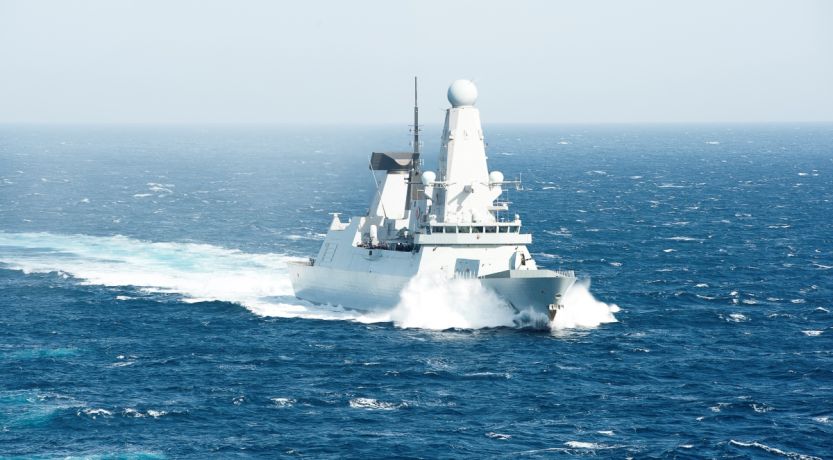America, like Britain before it, has been undisputed ruler of the waves. But the winds of change signal growing conflict in the struggle for control of the seas. What does the Bible say about sea power and global trade in the end times?
“Control of the seas can mean peace. Control of the seas can mean victory. The United States must control the seas if it is to protect your security,” said U.S. President John F. Kennedy, June 6, 1963.
Leaders throughout history have realized the vital importance of sea power. And now as America’s reign as ruler of the waves seems to be fading, countries around the world are reconsidering their own naval strategies.
New naval arms race
Looking at just the three largest navies shows that serious competition is underway. Both Russia and China have more attack ships and submarines than the U.S., but total numbers don’t tell the whole story.
USA Today reported, “Small surface combatants comprise the majority of China’s attack ships, while the U.S. dominates when it comes to larger combatants and aircraft carriers. Raw numbers aside, the U.S. has the war fighting edge when it comes to advanced technology, weapons systems and operational capabilities.”
But things are changing fast. Reuters reports that the Chinese navy “now has about 400 warships and submarines, according to U.S. and other Western naval analysts. By 2030, the Chinese navy could have more than 530 warships and submarines, according to a projection in a 2016 U.S. Naval War College study.
“A shrunken and overworked U.S. Navy, which has ruled the oceans virtually unchallenged since the end of the Cold War, had 288 warships and submarines at the end of March, according to the Pentagon.”
Threats to continued American dominance
Competition is growing and U.S. vulnerabilities are being increasingly scrutinized and exploited.
Some of the dangers it could face include:
- Espionage providing various enemies with the vulnerabilities of U.S. vessels as well as plans for replicating U.S. technologies.
- Asymmetric attacks by small boats, divers, mines and even trained dolphins and beluga whales.
- Crowded waterways and overtaxed crews leading to accidental or intentional collisions.
- Cyberattacks.
- EMP attacks (electromagnetic pulse weapons frying a ship’s electronics).
- Anti-satellite weapons disrupting command and control.
Updated tech, outdated assumptions?
In light of such dangers, some believe U.S. military strategies and assumptions have made America more vulnerable.
Christian Brose, author of a forthcoming book on the future of warfare, wrote in Foreign Affairs that since the end of the Cold War, the U.S. military “assumes that any quantitative advantage that an adversary may possess will be overcome by its own superior ability to evade detection, penetrate enemy defenses, and strike targets. And it assumes that U.S. forces will suffer few losses in combat.
“These assumptions have led to a force built around relatively small numbers of large, expensive, and hard-to-replace systems. … What’s more, systems such as these depend on communications, logistics, and satellite networks that are almost entirely defenseless, because they were designed under the premise that no adversary would ever be able to attack them” (May/June 2019, p. 128).
Potential adversaries will have plans to exploit these vulnerabilities. Navy Times reported:
“China’s Rear Adm. Luo Yuan, the deputy head of the Chinese Academy of Military Sciences, added fuel to the South China Sea fire when he stated the key for Chinese domination in those hotly contested waters could lie in the sinking of two U.S. aircraft carriers. …
“‘What the United States fears the most is taking casualties,’ the admiral said, before adding that such an attack on two of the U.S. Navy’s steel behemoths would claim upwards of 10,000 lives.”
Such threats are only part of the picture. The geopolitical realities are shifting, as Britain and the U.S. continue losing sea gates they long controlled.
Losing strategic sea gates
One key aspect of the rise of British and American naval and trading power has been their control over strategic sea gates or choke points around the world. You can learn more about this in our booklet The United States, Britain & the Commonwealth in Prophecy, especially the infographic on pages 78-79.
This booklet traces the historical and prophetic significance of the rise of these nations—and their decline. It shows that national sins are playing a part in the dismantling of these strategic advantages.
Consider how their influence has been diminished or is being threatened in places like:
- The Suez Canal: under British control until 1956.
- The Panama Canal: since 1999 controlled by Panama, and now run by a Chinese company.
- Strait of Malacca: under British control until 1957.
- South China Sea: the U.S. continues freedom of navigation exercises, while China builds islands and bases to reinforce its claim (see “Route of Contention” and “China’s Dream”).
- Sri Lanka: Chinese investments allowed China to gain control of a strategic port (“How China Got Sri Lanka to Cough Up a Port,” The New York Times).
- Strait of Hormuz: Iran threatens this route of much of the world’s oil in defiance of the U.S. and Britain.
- Gibraltar: Brexit has reignited conflict with Spain over this strategic entrance to the Mediterranean.
All of this portends a significant decline in power for these nations that have policed the world’s oceans for centuries. Could it be a fulfillment of God’s warning to sinful people that He would eventually “break the pride of your power” (Leviticus 26:19)?
While China appears to be the greatest threat now, many other countries are upgrading their navies. In a world where America’s security umbrella is being doubted, even allies are scrambling for ways to protect their national and regional interests.
Considering these and other troubling trends, what will the future hold?
Ships, international trade and maritime conflict all play a part in end-time Bible prophecies.
Prophecy of end-time European naval power
One major event of the end time will be a final conflict between “the king of the South” based in the Middle East and “the king of the North” based in Europe. Daniel says, “At the time of the end the king of the South shall attack him; and the king of the North shall come against him like a whirlwind, with chariots, horsemen, and with many ships; and he shall enter the countries, overwhelm them, and pass through” (Daniel 11:40, emphasis added).
Though Daniel described them using the military technology of the time, the ships and other equipment will surely be the latest in state-of-the-art weaponry. The northern army and navy will rapidly overrun many nations in the Middle East (verses 41-43).
This European power, also known as “the beast,” will seem to have unmatched military power. People will marvel: “Who is like the beast? Who is able to make war with him?” (Revelation 13:4). This bloc of 10 nations or groups of nations will have a role in subjugating many of the English-speaking peoples (see “What Is Jacob’s Trouble in End-Time Prophecy?”).
But no matter how great the end-time naval powers become, they will be no match for the power of the Creator God. As human evil grows worse and worse, God will reassert His control over the waves.
But no matter how great the end-time naval powers become, they will be no match for the power of the Creator God. As human evil grows worse and worse, God will reassert His control over the waves.
The second trumpet plague strikes the seas and ships
Throughout the Bible, God warns that sin—breaking God’s beneficial laws—brings terrible consequences. In the end time those consequences will crescendo to a terrible climax. God warns of seven plagues announced by trumpets. The second of these plagues will strike the seas and ships:
“Then the second angel sounded: And something like a great mountain burning with fire was thrown into the sea, and a third of the sea became blood. And a third of living creatures in the sea died, and a third of the ships were destroyed” (Revelation 8:8-9).
Learn more in our article “Why Will God Send the Seven Trumpet Plagues?”
Sadly, even in the face of these plagues, John records that people “did not repent” of their sins and rebellion against God (Revelation 9:20-21).
The fall of Babylon
Near the end of Revelation we read of humanity’s last great effort to live apart from God. The wealth and power of this evil end-time Babylonian system is tied to its prowess in international trade. When this end-time Babylon falls, many will mourn.
“‘For in one hour such great riches came to nothing.’ Every shipmaster, all who travel by ship, sailors, and as many as trade on the sea, stood at a distance and cried out when they saw the smoke of her burning, saying, ‘What is like this great city?’
“They threw dust on their heads and cried out, weeping and wailing, and saying, ‘Alas, alas, that great city, in which all who had ships on the sea became rich by her wealth!’” (Revelation 18:17-19; see our article “What Is Babylon?”).
While the merchants and sailors will mourn, God’s people will rejoice to know that this evil system that persecutes and martyrs true Christians and trades in the “bodies and souls of men” will finally be stopped (Revelation 18:13, 20, 24).
“As the waters cover the sea”
The end of this evil power will signal the beginning of a greater power that will produce even greater prosperity: the Kingdom of God. Jesus Christ will return to save humanity from self-destruction and will establish the Kingdom of God to rule over the earth and seas with true justice and for the good of all.
“Neither shall they learn war anymore” (Isaiah 2:4), neither on land nor on the sea. “They shall not hurt nor destroy in all My holy mountain, for the earth shall be full of the knowledge of the LORD as the waters cover the sea” (Isaiah 11:9).
In the end God will rule the waves, and the result will be peace.
Study more about end-time events leading up to the return of Christ in our free booklet The Book of Revelation: The Storm Before the Calm.






